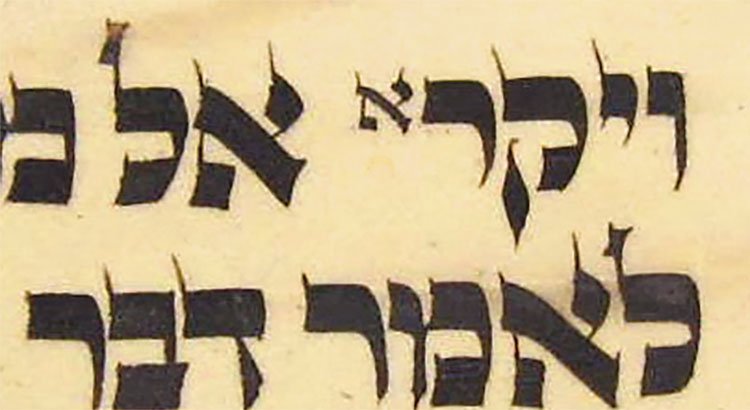A tiny aleph in Leviticus notes great significance about an important meeting – United Hebrew Congregation Terre Haute

During recent Shabbatot, we’ve been reading from the Book of Leviticus.
Leviticus is the third book of the Torah, and is told primarily through Hashem’s speech to Moses about how Moses should instruct the Israelites.
This is a break in form from the more narratively skewed books of Genesis and Exodus.
Through Hashem’s words to Moses, the Israelites are told how to interact with one another, how to make sacrifices, how to handle legal disputes and how to act in a holy manner.
Leviticus is instead concerned with legal, ritual and moral practices. Through Hashem’s words to Moses, the Israelites are told how to interact with one another, how to make sacrifices, how to handle legal disputes and how to act in a holy manner, among many other instructions.
Many may find Leviticus to be unrelatable — too archaic or too legalistic to really be relevant to our day to day lives. But I find the content of Leviticus to be remarkable and fascinating, beginning right from the first word of the book’s first chapter.
The first word is a good place to start
In Jewish tradition, biblical parshiot are named for their first words, and the biblical books are named for their first parasha. The first line of Leviticus states Vayikra el Moshe…., or “Hashem called to Moses….”
Therefore, the first parasha in Leviticus is called Vayikra, and the Hebrew name for the book itself is also Vayikra.
Fascinatingly, there is something very peculiar about how the word vayikra appears in the Torah. All of the letters are formatted normally, except for the aleph at the end of the word, which appears smaller than all of the rest of them.
The letter’s size does not affect its pronunciation or accent. So how do we make sense of this tiny little aleph?
Many believe this aleph is so small because Moses and Hashem had a disagreement about what word to write.
Moses and Hashem disagreed, then compromised
Moses wanted to write “vayikar” or “he happened” and Hashem wanted Moses to write “vayikra” or “he called.”
Finally, Moses, begrudgingly perhaps, wrote the aleph small as a compromise. This interpretation hinges on a lot of factors, including the issue of biblical authorship. But I do love the potential give and take and discourse that might have been occurring between Hashem and Moses on Mount Sinai.
Some believe the aleph is small because this is an instance of Hashem speaking to Moses from inside the Tent of Meeting, rather than out in the world.
Some believe the aleph is small because this is an instance of Hashem speaking to Moses from inside the Tent of Meeting, rather than out in the world.
To recognize the constricted nature of this speech and where it was given, the aleph itself is constricted as a symbol.
Take a moment for reflection
There are many such scribal anomalies. This tiny aleph is one. There are several words in the Tanach that are marked heavily with dots that look like cantillation marks, as well as some fascinating lettering.
When we come across these strange words and letters, we are forced to pause, to ask ourselves what the text is trying to tell us. We take some time to ponder these unfamiliar sights.
When we come across these strange words and letters, we are forced to pause, to ask ourselves what the text is trying to tell us. We take some time to ponder these unfamiliar sights.
So while we may struggle with the content of Leviticus, or find it far removed from our own lives, we can recall this tiny aleph right at the beginning of this book.
Whether we feel constricted by it, or whether we take it as a sign that we are still in dialogue with the text and with Hashem, I hope we can take a moment for wonder and fascination, all the same.
Student Rabbi Rocki Schy will serve UHC Terre Haute during the 2022-23 and 2023-24 academic years.






